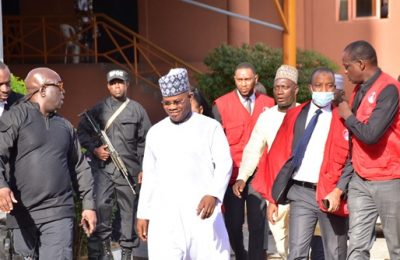Justice Jude Onwuegbuzie of the High Court of the Federal Capital Territory (FCT), sitting at Apo, Abuja, on Thursday fixed January 23, 2025 to rule in the objection raised by a former Minister of Power, Dr Olu Agunloye, to the amendment of the charge preferred against him by the Economic and Financial Crimes Commission (EFCC).
The former minister is being prosecuted by the Economic and Financial Crimes Commission (EFCC), on behalf of the Federal Government, before sitting at Apo, Abuja, in the suit, marked FCT/HC/CR/617/2023, on a seven-count charge bordering on forgery, disobedience of presidential order and corruption in the Mambilla power plant project in Taraba State.
In the suit, EFCC alleged that Agunloye on May 22, 2003 awarded a contract titled “Construction of 3,960 megawatt Mambilla Hydroelectric Power Station on build, operate and transfer basis to Sunrise Power and Transmission Company Limited without any budgetary provision, approval and cash backing.

The commission also, among others, alleged that it traced some suspicious payments made by Sunrise Power and Transmission Company Limited to accounts of the former minister, who served in the administration of former President Olusegun Obasanjo.
The defendant, however, pleaded not guilty to the charge preferred against him.
Justice Onwuegbuzie fixed the January 23, 2025 date after listening to parties adopting their processes for and against the amended charge.

While adopting his processes against the amended charge sought by EFCC, Agunloye, through his counsel, Adeola Adedipe SAN told the court that the prosecution’s attempt to amend the charge was an overreach.
Adedipe argued that the amendment sought is an overreach, submitting that Leno Adesanya whose name is being imported into the amended charge by the virtue of the judgment of Justice Inyang Ekwo of the Federal High Court, Abuja, had acquired a declarative right in realm.
According to the senior advocate, that right was enforceable by the court by virtue of Section 287(3) of the 1999 Constitution of the Federal Republic of Nigeria (as amended).
He, therefore, urged the court to dismiss the prosecution’s application to amend the charge by holding that no cogent and verifiable reasons have been adduced for such amendment.
The prosecuting counsel, Abba Muhammed SAN, however, objected to this submission, asserting that the prosecution’s right to fair hearing as guaranteed by Section 36 of the Constitution will be violated if the defendant’s oral submission is taken into account.
Earlier, the prosecutor while adopting the complainant’s processes informed that the Motion on Notice seeking to amend the charge against the former minister was brought pursuant to Sections 216(1) and (2) and 217 of the Administration of Criminal Justice Act (ACJA), 2015.
He then urged the court to grant the prosecution’s prayers, seeking an order granting leave to amend the instant charge against the defendant and an order seeing the amended charge filed on June 25 against the former minister properly filed and served.
Explaining how the amended charge is an overreach in his process sighted by Tribune Online, Adedipe argued that EFCC, through the amended charge, is trying to repair the admission by its own witness, first prosecution witness (PW1) that nothing is in Agunloye’s bank statement disclosing transfer or receipt of monies by him from Sunrise Power and Transmission Company Limited.
The senior advocate stated that the witness’s admission during cross examination was “damaging” to the prosecution’s case, which was the reason it sought to repair same by altering or amending the charge, thereby overreaching the defendant.
According to him, “Justice of the matter requires the court to be aware of this attempt at an overreach, before any amendment can be done, or else, the prosecution will continue to amend at every instance evidence of its witnesses are demolished; thus making proceedings to be a hide and seek.”
The defendant’s counsel submitted that despite Justice Ekwo’s judgment prohibiting the complainant from investigating or prosecuting anything relating to the Mambilla project, it still sought to “clandestinely infuse the name of Leno Adesanya in the charge and continue prosecution of this case”.
On its part, EFCC, in one of its processes also sighted by Nigerian Tribune, submitted that it could alter or amend a charge without leave or formal application at anytime before judgment going by the provisions of Sections 216 and 217 of ACJA.
According to the commission, in an instance of such amendment by the prosecution the court was required by law to take fresh plea of the defendant.
EFCC further submitted that going by the provisions of ACJA and the various authorities it cited to argue in favour of its application for amendment of the charge, the court had the power to grant the application as prayed.







